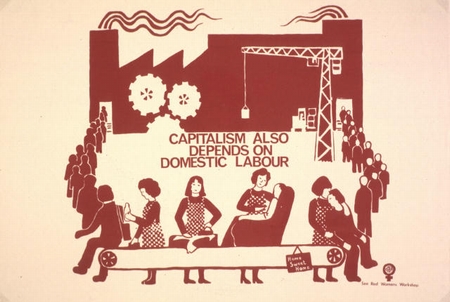Guest Post: Digesting Race, Gender, and Derrida
Published by SHARECITY on the 22nd September 2016.

For the September reading group, our three papers were “An Interview with Jacques Derrida on the Limits of Digestion”, Rachel Slocum’s “Race in the Study of Food”, and Wilma A. Dunaway’s introduction to Gendered Commodity Chains.
The interview with Derrida is very brief, and initially functioned as a springboard for discussion about the two other papers.The interview ends with a typically Derridean provocation about the need to respect the excess, in food or in a text, that cannot be assimilated or fully consumed. The idea of excess, what is beyond measure or containment within an economy, methodology, or theoretical framework was the thread or theme that brought together our discussion of Dunaway and Slocum.
Slocum’s article gives an overview of different ways of theorizing race. It was particularly useful in light of previous months’ food security discussions about culturally appropriate food. Slocum defines food as
“all the processes that make animal, vegetable or mineral into something to eat and then all that is involved in what happens next to bodies and societies” (303).
This broad approach, particularly the “what happens next” element, was a great way to get us thinking about race and gender.
Slocum also makes explicit the need to theorize race, to think what the political implications are of any use of the term ‘race’, and to think about food within circulations of power. She gives an overview of the potentials and limitations of social constructivist approaches to race. She notes the tenets of social constructivism: race is a fiction; it exists only as a discursive category. Slocum argues that as a consequence of the attention to discourse, much of the work of social constructionists focuses on representation, or the way discourse materializes race. Slocum briefly touches on performativity, which may offer a corrective to a strictly social constructivist approach in that it has the capacity to show how the racialized body is able to perform both normalized and transgressive identities. However, Slocum’s larger point, nonetheless, is that social constructivist approaches can be deterministic
This critique of the limits of social constructivism brought us to Slocum’s most challenging and fruitful points regarding an alternative to social constructivist approaches. Slocum notes that social constructivism developed as a counter to essentialist thinking about race and gender. While recognising how valuable this critique of essentialism is, Slocum nonetheless suggests that new materialism or corporeal feminism has something to add to the discussion on race and food.
Social constructivist approaches to race and food, in being attentive to the power of discourse, render the material completely inert. Food is reduced to another expression of racism or imperialism and simply consumed. For their part, bodies (black, female, etc), even when rendered in a positive light to recover them from racist representations, remain acted upon. The implication is that social constructionism may risk re-enforcing the power of the discourse to which it draws attention by offering no way out of it. Social constructivism also perhaps overplays a human capacity to shape the physical world, be it bodies or ‘nature’.
Slocum’s theorization of an alternative to social constructivism is focussed through excess. She uses this Derridean term in a rather Derridean endeavor of investigating the limits of binary thought (human/nature; mind/body; active/passive). The excess Slocum highlights is the corporeal, the material, which is not merely inert and acted upon. Instead, Slocum draws attention to a number of scholars working on an idea of the material as a biophysical outside that induces subjectivity while not determining destiny. Slocum argues for a radical re-appraisal of both subjectivity and agency when thinking about both bodies and the biophysical outside. Slocum also points to the idea of subjectivities as assemblages and of an ethics of conviviality that is suggestive of a politics other than oppositionality, transgression, revolution, or utopian social change – and this too was salutary for our discussion.
Slocum manages to cover a range of theoretical approaches succinctly without being reductive, signalling further avenues of reading and discussion. One of the most challenging questions for our discussion was thinking of race in an other than social constructivist manner, as this seemed to lend itself to essentialism.
Dunaway, albeit from a very different theoretical framework, is also interested in excess, though with the aim of capturing it. She focuses on what traditional economics tends to ignore. She notes that commodity chain analysts have tended to focus on the small number of waged workers within export productive networks, or to focus entirely on firms. There are a number of things left out of such an analysis: the role of reproduction in sustaining a capitalist system, the need to include the household in commodity chain analysis, the role of the informal sector in commodity chains, and women’s inequitable labour. For Dunaway, it is impossible to understand current global trends or to assess directions for activism without attention to the scope of women’s work and widening gender inequalities. This edited collection gives such attention and also advocates for a world systems theory approach to understanding capitalist modes of accumulation.
Dunaway is persuasive in drawing attention the ways in which capitalism undercuts itself by externalizing unsustainable costs to households; as a result, the future reproduction of labourers, households, and communities is threatened. However, we did question whether the block-chain analysis of commodity chains was perhaps excessively linear and also over-determined, making it difficult to see any already-existing alternatives.
We ended the discussion where we began: with Derrida’s interview, and with a more reflective conversation about ways of approaching theory – possibly that it’s a space for foraging and also a way of reflecting on the foodways that we have already inherited or imbibed, rather than explicitly chosen.
HOLLY MCINDOE, FOOD STUDIES READING GROUP
© 2015 - 2024 ShareCity | Web Design Agency Webbiz.ie










